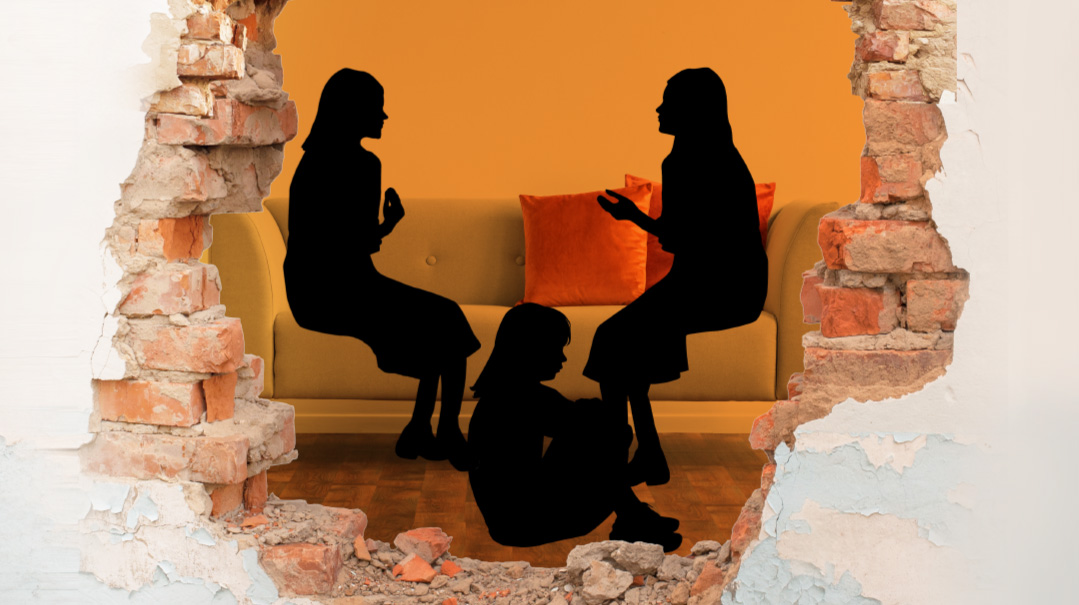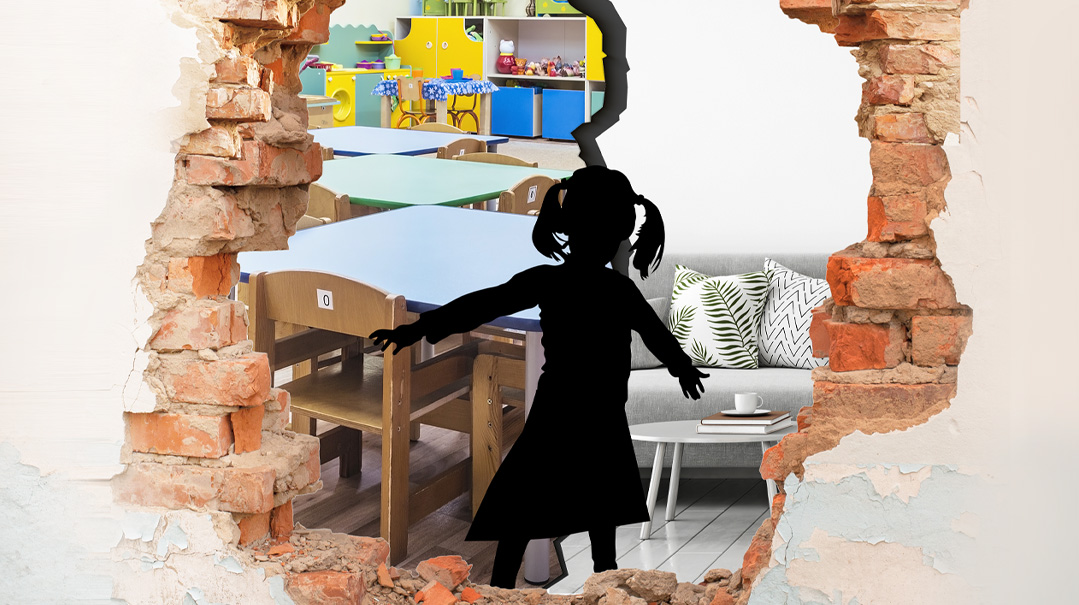Is My Therapist Right? Or My Mentor?

My mentor’s approach feels more hashkafically correct, but my therapist’s attitude seems more practical and helpful

Moderated by Faigy Peritzman
After several years of marriage, I realized it was time to reach out for help. Shanah rishonah had been great, but over the years and with each successive child, things had spiraled rapidly out of control. The tension and negativity in our home had become unbearable.
I began seeing an excellent marriage coach/mentor. Propelled by a strong drive to make things better, I really invested myself into grueling inner work. After a few months, my mentor referred me to a professional therapist to help me pinpoint my challenges.
I immediately connected well with my therapist, and slowly but surely, I began to see progress... on my end. My husband also agreed to see a therapist, but after a year, although he claims he sees progress, I don’t see much of it in our daily relationship. My therapist suggested couples therapy, but my husband is adamant that it’s enough that we are each seeing our own personal therapists — he doesn’t see a need for more.
I’ve stayed in touch with my mentor all this time, speaking with her on a weekly basis for moral support. I often review issues with her that I work on in therapy as well. Lately, though, my mentor expressed concern that my therapist’s approach to marriage isn’t completely aligned with the Torah way, despite the fact that she’s a frum woman.
For example, my therapist feels very strongly that my husband needs to do his share in working on our marriage, because one spouse alone won’t accomplish much. But my mentor claims the Torah perspective is that each spouse needs to put all of their efforts into marriage, regardless of what their spouse does or doesn’t do. My therapist insists we’re at a standstill since my husband refuses couples therapy, while my mentor is convinced that my own inner work is beneficial for both of us.
I spoke to our rav, but because many of these thoughts are very subtle, he felt he couldn’t guide me. He also was confident that since the therapist is a frum woman in our community, I could rely on her.
I feel like I’m caught between two opposing approaches, and I’m confused. I like my therapist a lot, and I think I’m improving in many areas of my life, but is she leading me on the correct path? My mentor’s approach feels more hashkafically correct, but my therapist’s attitude seems more practical and helpful. What is the Torah approach to one’s avodah in marriage? And what do I do when I’m not sure which method to follow?
Rabbi Dovid Ostroff, formerly the rav of the Neve Family Clinic, is a posek in Har Nof, Israel.
The bond of marriage has many elements. In addressing this question, we will focus on two major parts. The marriage bond has two major components. One is the mutual obligations and benefits that apply to both parties in the marriage, and the other is their unity and shleimus.
The former is partially outlined in the marriage kesubah, and includes elements such as providing physical care, clothing, a place to live, etc. Were we to simplify it, if, in a particular household, for example, the wife does the cooking and the husband goes out to work and earns a living, or vice versa, both are contributing to the mutual upkeep of the home, with each one performing their respective tasks.
In his monumental work, To Become One: The Torah Outlook on Marriage, Rav Ezriel Tauber ztz”l writes that as long as the marriage is intact, each party is required to continue doing his part, even if the other party is not living up to their side of the agreement. For example, he must still pay for medical bills even if she refuses to cook meals. Rav Tauber compares such a marriage to a body where a certain limb, like a hand, is not functioning so well. The rest of the body does not punish the hand; to the contrary, it will do as much as it can to make up for the hand’s limitations.
On the other hand, unity and shleimus must be a mutual goal. For two parts to become a whole, to personify the Torah ideal of “they shall be of one flesh,” both parties are required to contribute enormously toward that objective. If one party believes he or she is perfect and that it is only the other person who needs to improve and change, while a neutral party believes that both require change, shleimus will not be reached.
Unity cannot be one-sided. If a husband (or wife) says, “My wife has a problem with the marriage,” he is making a mistake, because he also has a problem with the marriage. It’s a mutual endeavor that needs both parties equally invested in creating this shleimus.
Achdus requires each partner to be willing to make space for the other. When one party remains rigid and unbending, and the other party is expected to simply do whatever it takes to accommodate the faults and failures of the other, this will not lead to unity. Rather, the person working on himself will feel used and exploited.
There are indeed couples where only one spouse needs to work on patience/anger/being nice, because the other spouse has already worked on those qualities — but both spouses must agree that this is the case. Obviously, this is not referring to a situation where one spouse is clearly not healthy, but refuses to get help.
In this case, although the mentor is a Torah personality, she is not a professional therapist, and it seems that she does not fully grasp that rather than being anti-Torah, the therapist is guiding her client to achieve the harmony the Torah mandates. With all due respect, not all mentors are equipped to deal with every kind of situation. Some have expertise in some areas and not in others, and one must look for a mentor who has experience in the particular area you are seeking guidance for.
When a therapist or professional believes that both parties need to invest effort to make the marriage work or to create unity, there is no reason to believe there is anything contradictory to Torah hashkafah in this approach.
Dr. Shula Wittenstein, Psy.D, specializes in trauma therapy and works with individuals and couples.
You describe your marriage as “spiraling,” leading you to look for direction and skills, reaching out to a mentor, and then to a therapist. From your description, your marriage wasn’t always this way. Shanah rishonah was a fun bonding time for you as a couple. This is an excellent baseline and resource to access and recall as you continue on your journey. It can also instill hope; we had it once, let’s get it back.
It seems as your joint responsibilities increased, things started to unravel. This may have been precipitated by a crisis or simply because the two of you may not have carved out time for self-care and quality time as a couple, an important insurance policy as life gets hectic.
In an attempt to navigate this apparent marital gridlock, both your mentor/coach and therapist have advised you with seemingly irreconcilable views. You feel torn between your mentor’s “Torah-sourced” perspective versus your therapist’s practical and helpful guidance as to what needs to happen. You’ve also consulted with your rav — always a positive step.
Your mentor asserts that the correct hashkafah in marriage is to “pool all efforts, regardless of what your spouse does.” As Jews, we’re all responsible to grow and improve our middos. Your mentor’s advice is always applicable to working on one’s middos. However, working on middos and going to couples therapy are not necessarily mutually exclusive, nor contradictory.
It seems that your rav also was not overly concerned with this query, as it may have little or nothing to do with the next best step to making your marriage better.
With regards to your therapist, her helpful and practical approach is an important factor in accomplishing your goals effectively. Yet she insists your own efforts are not enough without your husband’s agreement to do more.
Nevertheless, your husband is adamant that his personal therapy is enough. Whereas it may be ideal to be in couples therapy at this point, it seems highly impractical to insist that a grown man go into therapy that he doesn’t want to be part of, and to make you feel like you are stuck without this option.
Let’s take another look at this. Assuming that the issue is in fact not exclusively hashkafic nor one of practicality, perhaps there’s a missing piece here.
You see progress on your end, and little if nothing on his. Your daily relationship still feels like a struggle with little improvement. That must be very difficult and frustrating for you — you’re putting in so much work because you want to see progress, and have a deeper connection and more positivity in your marital relationship.
You describe your marriage coach/mentor as “excellent” and say you “connect well” with your therapist. Clearly, you are a good connecter who appreciates strong alliances with the people you trust and care about. I wonder, though, if you may be inadvertently creating a triangle between you, your mentor, and your therapist. That’s a lot of relationship building; a lot of energy invested in these two relationships. (I also wonder if your therapist is aware that you are speaking with your mentor regularly, and how that affects your therapy, your marital growth, and your dilemma.)
Could it be that the relational energy you have is being used to navigate this triangle instead of being freed up to allow for a more emotional relationship with your husband? Is it possible that the three-way bond that you have created is inadvertently sidelining him?
If the purpose of you both going to therapy is to become healthier as individuals and as a couple, you should be skillfully and compassionately encouraged by both your mentor and your therapist to better your relationship with your husband, even if he doesn’t feel it’s necessary, or is blocked in some way from coming to couples therapy. The measure of productivity in therapy is not how wonderful the relationship with your therapist or mentor is, but how that translates within your relationship with yourself and most meaningful other.
Perhaps redirecting the energy and preoccupation with your two guides would allow you to focus more on your relationship with your husband. He, too, has put in work, and no doubt your marriage is important to him. Shifting your attention to him, and recognizing his investment in self-improvement, will likely help him feel safer, more included, and less adamant about resisting couples therapy.
Your guides are the facilitators, but it is both of you who have the power to restore peace and balance to your relationship in real time.
Highlighting each other’s efforts, spending time together as a couple, empowering each other as the parents of your children, and bringing back the joy and taste of shanah rishonah will ultimately be far more impactful than anything else.
Keep your eyes and your heart on the goal. Look toward each as you navigate the next best step to reconnection.
Esther Gendelman, MS., LPC., ACS., is a licensed psychotherapist and approved clinical supervisor who specializes in working with relationships. A veteran educator, speaker, and Yated columnist, as well as coauthor of a book entitled The Missing Peace (Menucha Publishers), she has a passion for helping people grow and maximize their potential.
This is a tough dilemma. You have appreciated the space for growth and exploration with your mentor and your therapist. And now they both seem to be guiding you in different directions. Your rav did not take a strong stand, except to humbly acknowledge that this is not his field and that he trusts the therapist.
Perhaps it behooves us to begin with the role of each of these women. A therapist is there to help you explore thoughts, emotions, patterns, and basically show you a mirror where, in the safe space of a therapeutic environment, you can gain insight and make choices from a healthy place within you. Unless the therapist is worried about your physical or emotional safety, she typically will not take a strong stance in telling you what to do. A mentor, on the other hand, might take more of an advisory role.
I wonder what your intuition tells you. What have you learned about the nature of your marital dynamic? Of course, when both people in a relationship are willing to work on their part, it’s easier to make progress. In the absence of that willingness, my first thought is curiosity about your husband’s reluctance. What do you each experience as the recurring pattern that creates obstacles to your closeness? When the pattern is explored without blaming, it creates a safe environment for people to recognize and acknowledge their responses that often occur, irrespective of the specific content. Yes, it is true that when one person changes the dance, the entire dance changes.
Have you asked your therapist about why she thinks it will not be helpful for you to continue to do this work on your own? Perhaps she sees a pattern in many of your relationships that concerns her, such as suppressing your pain, emotionally withdrawing, or continuing to give without receiving, all of which can eventually backfire. Perhaps she sees you losing some of your vitality, or this dynamic affecting your moods in a way that harms you.
In a recent conversation with a wise rav about one of the couples I was working with, he said to me that certain couples come to him to receive a psak of clear right or wrong, only to use it against their spouse. Being right does not create closeness. Being willing to listen and hear other perspectives and experience empathy for the other’s emotional reality is what fosters emotional intimacy. This rav told the particular couple I’m seeing that he will not get involved; their issues are not rabbinical in nature, they are relational, and that’s the therapist’s role in marital therapy.
Yes, the ideal is that a husband honors his wife more than himself and that a wife works to please her husband. And when that atmosphere flows through the home, working through conflict and creating win/win solutions is so much easier. Both spouses care about the wants, needs, and well-being of the other. When that ideal is missing, the question is what can be done to achieve this? I am privileged to work with couples where each partner is doing their best to look in the mirror, stay in their lane, and become a better version of themselves, which enhances their marriage greatly.
There is no way that anyone reading your question can tell you with certainty which approach is correct in your case, as there is far too much information that is unknown to us. What has already changed within your relationship? What is the capacity for change? What do both people want in the marriage? What has been tried already? How has the request been delivered to your husband? Is he afraid this is a ploy to “fix” him? Has either your mentor or your therapist met your husband and heard his perspective?
There are some wise principles that Rabbi Dr. Twerski a”h used to quote frequently from the 12-Step program. One concept is known as detachment from the outcome. We can only do our part of the process and cannot control another person’s choices or responses. We are only responsible for doing our best in any given situation. As the mishnah in Avos tells us, “Lo alecha hamlachah ligmor — It’s not up to you to finish the work.” As this pertains to marriage, we are responsible to show up and be the kind of spouse we need to be. At the same time, we accept that we are unable to change someone else.
A second concept from the 12-Step program is the Serenity Prayer, in which we request that Hashem grant us the ability to change what we can and to accept the reality of what we cannot, and the discernment to know the difference.
Sometimes having too many cooks can confuse the process. Rarely is there only one rigid way. As long as your rav is not telling you that you are doing something wrong according to Torah hashkafah, why not continue to explore your own bechirah from the healthiest place you can reach and make a decision from that place? I have been told by many rabbanim who work alongside mental health professionals that our job is to help our clients reach a healthy place from where they can make informed choices. If continuing to work on your marriage individually brings you to a better place and helps you to look in the mirror and respect your efforts as a wife, regardless of your husband’s work, then by all means continue. But if your individual efforts at this point hurt you emotionally or lower your self-respect or enable bad behavior, then it is not a wise idea to continue like this.
I wish you continued hatzlachah on your courageous journey of self-knowledge and growth, and daven that you and your husband grow together with the brachah of shalom and menuchas hanefesh.
(Originally featured in Family First, Issue 824)
Oops! We could not locate your form.







